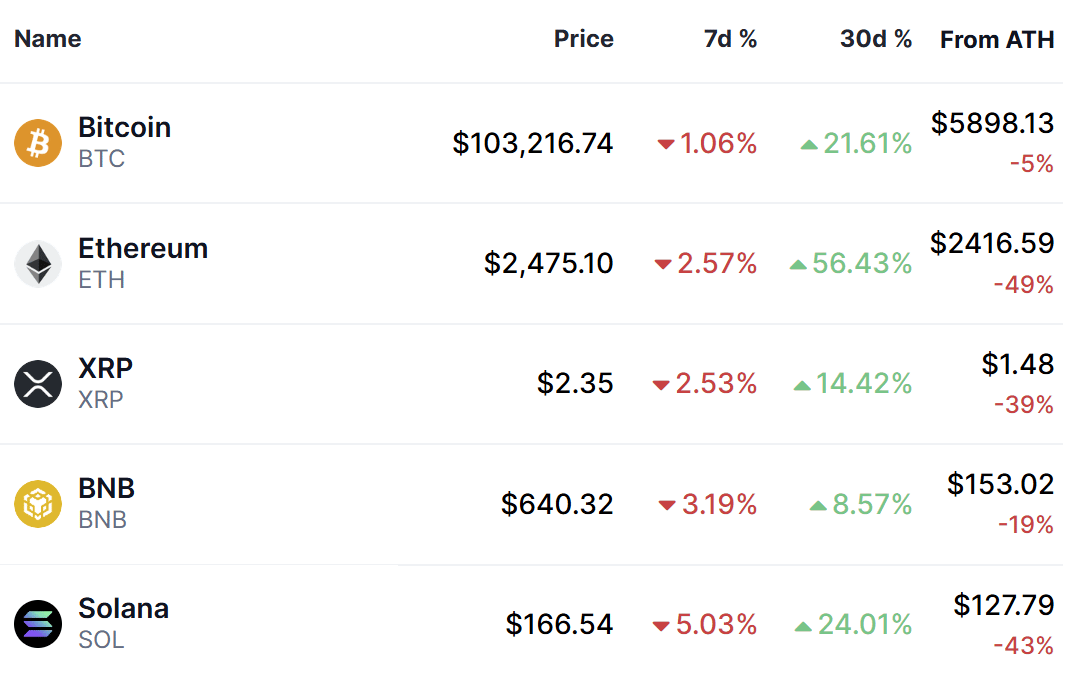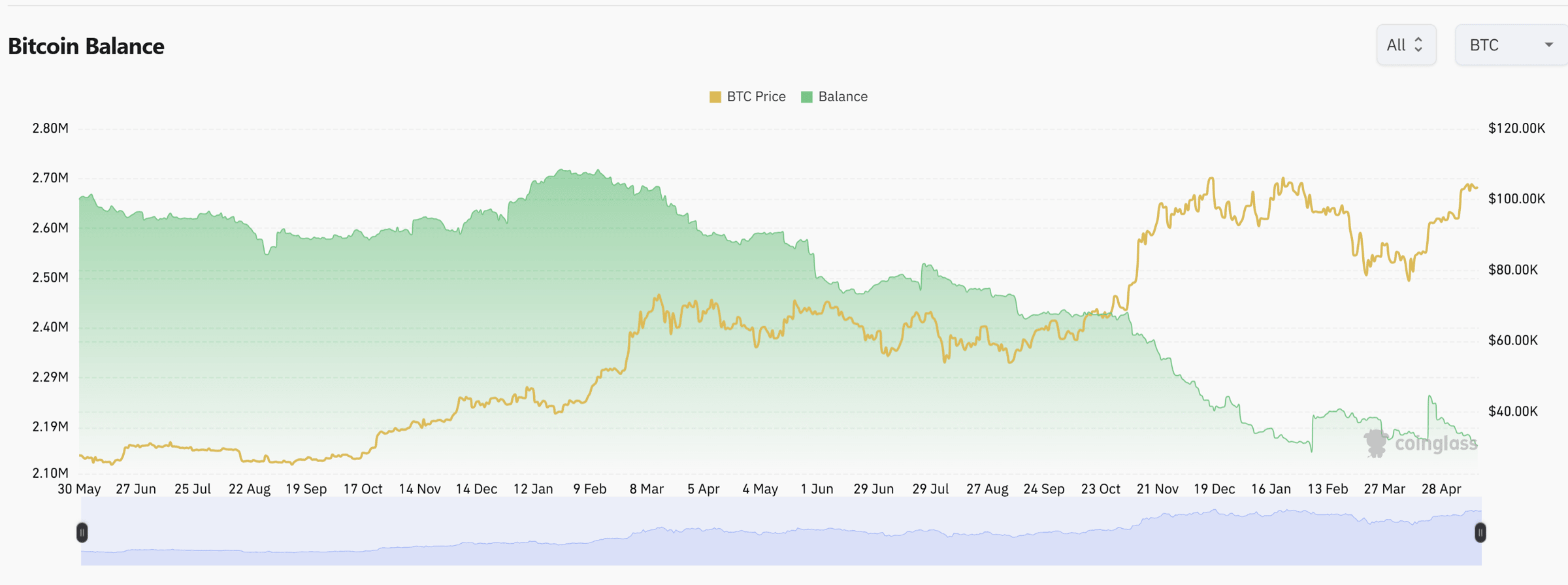Hi Reader,
Thanks for reading The BlockByte Weekly, where we summarise the key updates in crypto over the last week and provide our perspective on what you need to know as an investor.
Big 5 Weekly Snapshot

Executive Summary
Over the last week, we saw corporations, funds, and governments signal continued interest in acquiring more bitcoin. In the last 7 days, over $5 billion in Bitcoin purchases were reported, driven by corporate treasuries and sovereign wealth funds. Key players like Basel Medical Group made headlines with $1B bitcoin purchase announcement, while South Korea’s pension funds edged closer to Bitcoin bill that would enable significant investment. Meanwhile, positive geopolitical developments, including U.S.-China trade talks, bolstered market sentiment, though risks like potential tariffs and recession warnings from JP Morgan’s CEO remain.
Market Update
Massive Institutional Bitcoin Buying
This week saw over $5 billion in Bitcoin purchases and disclosures by institutions. Key buyers, ordered by purchase size, include:
- Goldman Sachs: Disclosed $1.65 billion in Bitcoin holdings, primarily through spot Bitcoin ETFs like BlackRock’s iShares Bitcoin Trust (IBIT).
- Strategy: Added $1.34 billion (13,390 BTC) to its existing position, increasing its total holdings to over 450,000 BTC, continuing its strategy as the largest corporate Bitcoin holder.
- Basel Medical Group (BMGL): Announced a new $1 billion Bitcoin treasury strategy, negotiating a share-swap deal to acquire BTC for its balance sheet to fund expansion and hedge inflation.
- Hong Kong’s Avenir: Purchased $863 million in Bitcoin, a new allocation by the investment firm to diversify its portfolio amid rising crypto adoption in Asia.
- Next Technology Holding: Acquired $600 million (5,000 BTC) as a new Bitcoin treasury position, signaling tech sector interest in crypto as a store of value and inflation hedge.
- Abu Dhabi Sovereign Wealth Fund: Bought $511 million in Bitcoin, a new investment reflecting Middle Eastern sovereign interest in digital assets as a hedge against global uncertainty.
- Twenty One Capital: Purchased $458.7 million in Bitcoin, its first treasury move post-SPAC merger, holding over 42,000 BTC as part of a strategy to drive corporate and sovereign adoption.
- South Korea National Pension Funds: Finalised legislation to allow Bitcoin investments, potentially enabling the world’s third-largest pension fund to allocate billions, though no specific purchases were confirmed this week.
- Heritage Distilling: A large whiskey company reaffirmed its policy to accept Bitcoin payments and hold profits in a Bitcoin treasury, as part of its craft distillery expansion.
The scale of institutional buying alone is outpacing the amount of new bitcoin that is being mined. At a fundamental level this means that the available supply of bitcoin on exchanges is declining which means that we can expect prices to increase.
Bitcoin Balanaces on Exchanges Hit 2-Year Lows (green line)

Moody's Downgrade US Sovereign Credit Rating
Moody's Ratings downgraded the U.S. sovereign credit rating from Aaa (highest) to Aa1 (one notch below) on May 16, 2025, stripping the U.S. of its last triple-A rating among major agencies.
The downgrade reflects over a decade of rising government debt and interest payment ratios, significantly higher than other Aa1-rated sovereigns. Moody's cited persistent large fiscal deficits (projected to reach 9% of GDP by 2035 from 6.4% in 2024), driven by increased interest payments, rising entitlement spending (e.g., Social Security, Medicare), and low revenue generation. Successive administrations and Congress have failed to reverse these trends, worsened by political polarisation and policy uncertainty, including Trump’s proposed tariffs and tax cuts.
Moody’s since changed its outlook from negative to stable, citing U.S. strengths like its dynamic economy, the dollar’s global reserve currency status, and an independent Federal Reserve. However, it expects federal debt to rise to 134% of GDP by 2035 (from 98% in 2024).
The announcement is somewhat signficant as the lower the credit rating, the higher the interest repayments are often expected on governement debt when purchased by foreign investors. Ultimately, it makes the US's debt position all the more publicly visible and is a large reason why countires have also been buying record amounts of gold.

Altcoins Surge on Positive Global Developments, but JP Morgan CEO Warns of 50/50 Recession Chance
Over the last month, altcoins like Ethereum (+55%), SUI (+79%), Solana (+23%) and XRP (+14%) have risen substantially on positive geopolitical announcements with respect to both trade wars and conflict. Below we've summarised the 3 major ones that are influencing markets:
U.S.-China Trade Negotiations: U.S. Treasury Secretary Scott Bessent confirmed "substantial progress" in trade talks with China during weekend negotiations in Geneva (May 17–18, 2025). U.S. Trade Representative Jamieson Greer highlighted confidence in addressing the $1.2 trillion U.S. trade deficit with China, calling it a "national emergency." The talks last week resulted in an agreement to slash the 145% tariffs to 30%.
India-Pakistan Ceasefire: India and Pakistan agreed to a ceasefire along their shared border in Kashmir, effective May 12, 2025, following months of diplomatic efforts mediated by regional powers. The Financial Times reported reduced hostilities, with both nations committing to further talks to de-escalate tensions, boosting investor confidence in South Asian markets and around the world.
Ukraine-Russia Peace Talks: The Financial Times noted early progress in Ukraine-Russia peace negotiations, with preliminary discussions held this week in Turkiye signalling a potential de-escalation of the ongoing conflict. While no formal ceasefire has been announced, diplomatic channels have reopened, raising hopes for a resolution that could stabilise Eastern Europe.
To conclude, JP Morgan CEO Jamie Dimon tempered markets recent enthusiasm, warning of a potential chance of a U.S. recession in 2025. Speaking at a financial conference on May 15, 2025, Dimon cited persistent inflation (hovering at 3.5%), elevated interest rates (Federal Reserve’s benchmark at 4.75–5%), and potential disruptions from Trump’s proposed 10% baseline tariff on all trading partners as key risks. He noted that a recession could curb consumer spending and corporate investment, impacting global markets.
For now, we remain cautiously optimistic.
Until next week,
James
James Brannan
Managing Director
BlockByte
james@blockbyte.com.au
https://blockbyte.com.au/

BlockByte does not provide financial advice. We provide a personalised brokerage service with tailored support, research and secure custody for investing in digital assets. Reach out to our team to discuss how we can help.
.png)
.png)